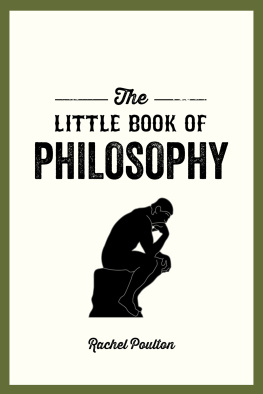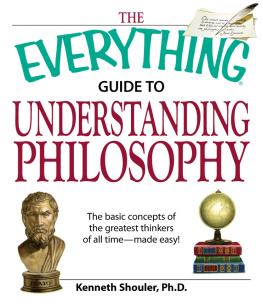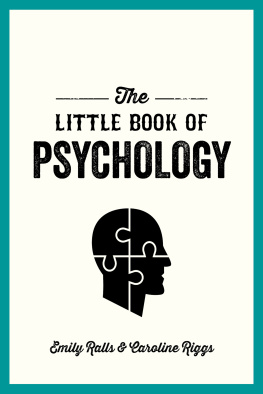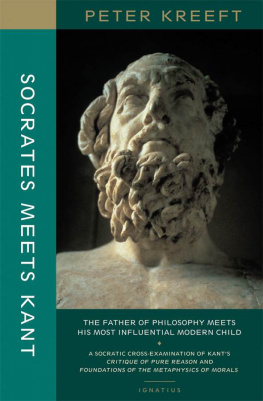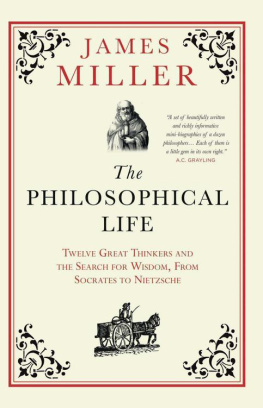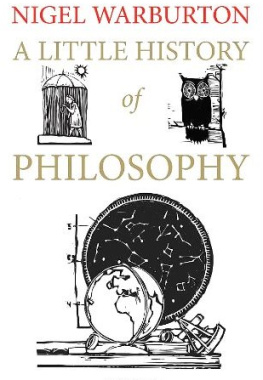

Copyright Summersdale Publishers Ltd, 2021.
First published in the United Kingdom by Summersdale Publishers, Ltd., Part of Octopus Publishing Group Limited.
All rights reserved. Except for brief passages quoted in newspaper, magazine, radio, television, or online reviews, no part of this book may be reproduced in any form or by any means, electronic or mechanical, including photocopying or recording, or by information storage or retrieval system, without permission in writing from the publisher.
Published in the United States by Cleis Press, an imprint of Start Midnight, LLC, 221 River Street, Ninth Floor, Hoboken, New Jersey 07030.
Printed in the United States
10 9 8 7 6 5 4 3 2 1
Trade paper ISBN: 978-1-63228-077-0
E-book ISBN: 978-1-63228-134-0
CONTENTS
Introduction
WHAT IS PHILOSOPHY?
Mention philosophy to most people and the image that springs to their mind might be one of professors stroking long beards while pondering unanswerable questions. Its often seen as a lofty discipline; a bit stuffy and inaccessible. But philosophy is simply a quest for wisdom and knowledge; philosophia in Ancient Greek literally means love of wisdom. The aim of philosophy is to ask and explore lifes big questions in order to help us work out what we should do and how we can live a good life. Philosophical enquiry is all about wanting to understand something rather than just to know it; its activeyou do philosophy. And, in a world of fake news and fake facts, embarking on a quest for truth couldnt be more important. Engaging in philosophy teaches us that passively scrolling through social media feeds and passively consuming information are not the answers. We should be busy asking questions and fully exploring the answers: enjoying the journey as much as the destination.
Philosophers are dynamic thinkers. They have been asking questions for thousands of years and through argument and reasoning they aim to come to conclusions that, hopefully, bring greater understanding and clarity. Questions such as: What is the meaning of life? Who am I? Am I free?
Given the sheer size of the subject it would be impossible to cover every aspect of philosophy here, but this book aims to take you on a whistle-stop tour through time and thought, touching upon the most important and fascinating philosophers and their ideasideas that have shaped Western thought for the past 2,000 years. We will journey to Ancient Greece, the birthplace of Western philosophy, take in a bit of Eastern philosophy, and then move on to the Medieval and Renaissance periods. An exploration of modern philosophy will bring us into the twentieth century, and postmodern philosophy will conclude our trip.
At first glance, philosophy can appear overwhelming: a vast sea of enquiry and knowledge. You can pretty much philosophize about anything: education, religion, science, language, feminismthe list goes on. But by the time youve finished this book, you should know your Metaphysics from your Epistemology, your Political philosophy from your Ethics, and you should be able to distinguish between Rationalism and Empiricism. You should also have a basic understanding of the main schools of philosophy and the key thinkersa jumping-off point from which you can then conduct your own deeper thinking in the areas that interest you. Most of all, my hope is that you finish this book with a new-found curiosity and a love of wisdom of your own.
Pre-Socratic Philosophy
For thousands of years philosophers have been attempting to come up with rational and reasonable answers to lifes big questions. But where did it all start? To answer this, we need to go back over 2,500 years to around the sixth century BC, to a group of original thinkers known as the Pre-Socratics (so-called because they came before that Titan of philosophy, Socrates).
Socrates would be concerned with how we should live, but before he arrived on the scene, the very first philosophers focused on the material nature of things: what are the Earth and space made from, and what is the fundamental nature of things? Not content with the accepted mythical and supernatural explanations of the time, the Pre-Socratics started to focus on what they sensed and experienced around them. They were the first to look for rational and logical explanations of the universe, instead of relying on the metaphorical teachings embodied in the myths and legends surrounding pagan gods.
They saw instead that the world was governed by rules that it was ordered and logical, and something that could be studied and understood. These early philosophical thinkers each had different ideas, but the four elements water, air, fire, and earthfeatured heavily in their theories of why things were so.
Thales (624546 BCsee page 10) was considered the very first philosopher; he was from the Milesian school of thought. He lived on the Mediterranean, surrounded by water, so his theory that water was the basis of everything is understandable. Anaximander (610546 BC), a student of Thales, couldnt work out how some thingsfire, for instancecould be made up of water. He had observed the four elements and saw them as unstable and opposed to each otherwater puts out fire, so how could any one of these physical elements be the basis of all things? Instead, he suggested that the universe and everything within (the kosmos) had come into existence when separated from the unbounded, or apeiron. This apeiron is not a substance; its something mysterious, eternal, and boundless. Anaximander believed everything was created from the apeiron and, when destroyed, would return there.
His student Anaximenes (585528 BC) disagreed with Anaximanders metaphysical theories. He observed that air could be transformed into various substancesit can be condensed to form cloud, further condensed to form water, even more condensed it becomes earth and at its most dense it becomes stone. In its less dense, or rarefied forms, air can be wind or fire. He thus concluded that air was the underlying element in all things.
Although all three theories sound pretty crazy, given our scientific knowledge these days, philosophical and scientific enquiry had begun. These early thinkers were observing the world around them, challenging the idea that the world and kosmos were created by gods, and attempting to explain the complexity and variability of all that surrounds us. They were engaged in rational enquiry.
THALES
624546 BC
Thales of Miletus was a wealthy and well-traveled Greek living in the affluent city of Miletus in modern-day Turkey by the Mediterranean Sea. He is considered the first real philosopher and therefore the founder of Greek and Western philosophy. He was also a businessman, an engineer, a mathematician, a politician, and an astronomer. Thales philosophical and mathematical enquiry drew on the wisdom of Egypt and Babylonia; it is thought he traveled to Egypt where he discovered he could calculate the height of a pyramid by measuring the length of its shadow. His geometrical theorems were based on ideas from the Egyptians and Babylonians.
Like most of the Pre-Socratic philosophers, what little we know about his life and philosophy comes from later accounts (many from Aristotle), and it is difficult to determine much about his life or exactly what his theories were, but we do have some ideas. In his book Metaphysics, Aristotle claimed that Thales was the first to suggest that all matter originates with one single element.
Next page
